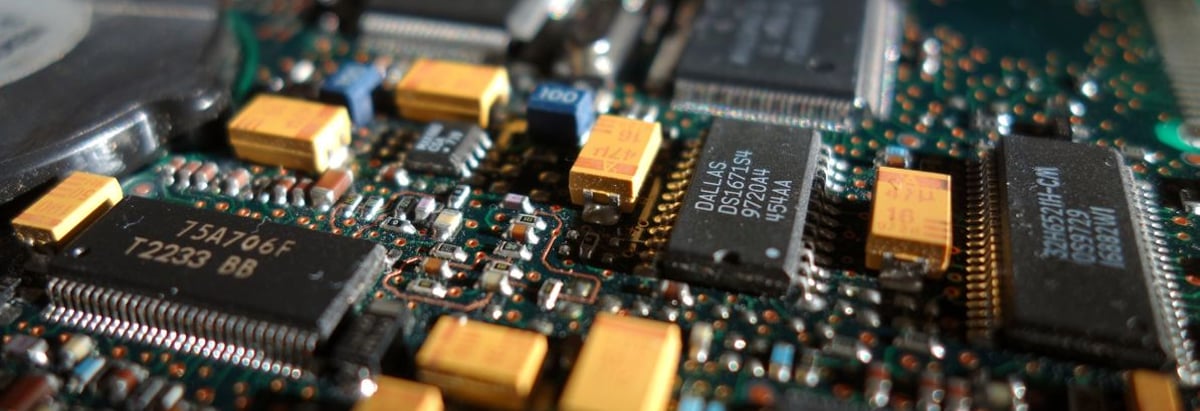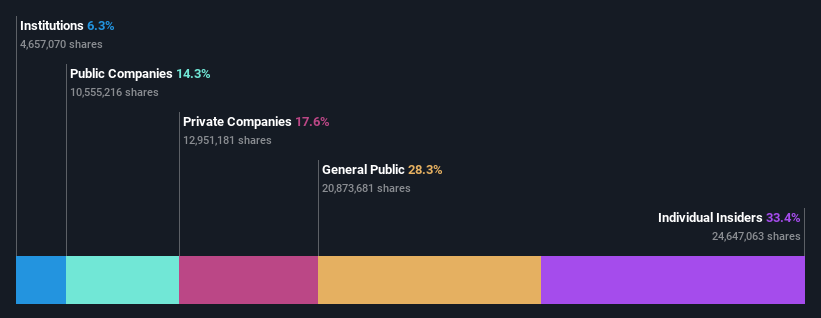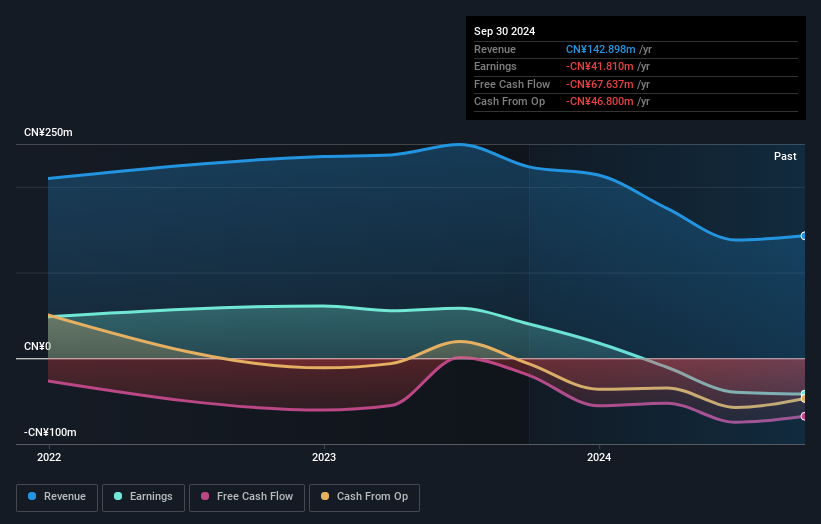- China
- /
- Semiconductors
- /
- SHSE:688693
Suzhou Convert Semiconductor CO., LTD.'s (SHSE:688693) top holders are insiders and they are likely disappointed by the recent 11% drop

Key Insights
- Suzhou Convert Semiconductor's significant insider ownership suggests inherent interests in company's expansion
- 56% of the business is held by the top 5 shareholders
- Ownership research, combined with past performance data can help provide a good understanding of opportunities in a stock
To get a sense of who is truly in control of Suzhou Convert Semiconductor CO., LTD. (SHSE:688693), it is important to understand the ownership structure of the business. The group holding the most number of shares in the company, around 33% to be precise, is individual insiders. That is, the group stands to benefit the most if the stock rises (or lose the most if there is a downturn).
And following last week's 11% decline in share price, insiders suffered the most losses.
Let's take a closer look to see what the different types of shareholders can tell us about Suzhou Convert Semiconductor.
View our latest analysis for Suzhou Convert Semiconductor

What Does The Institutional Ownership Tell Us About Suzhou Convert Semiconductor?
Institutional investors commonly compare their own returns to the returns of a commonly followed index. So they generally do consider buying larger companies that are included in the relevant benchmark index.
We can see that Suzhou Convert Semiconductor does have institutional investors; and they hold a good portion of the company's stock. This suggests some credibility amongst professional investors. But we can't rely on that fact alone since institutions make bad investments sometimes, just like everyone does. It is not uncommon to see a big share price drop if two large institutional investors try to sell out of a stock at the same time. So it is worth checking the past earnings trajectory of Suzhou Convert Semiconductor, (below). Of course, keep in mind that there are other factors to consider, too.

Suzhou Convert Semiconductor is not owned by hedge funds. Looking at our data, we can see that the largest shareholder is Guohua Ding with 15% of shares outstanding. Meanwhile, the second and third largest shareholders, hold 14% and 13%, of the shares outstanding, respectively. Ying Luo, who is the third-largest shareholder, also happens to hold the title of Member of the Board of Directors.
To make our study more interesting, we found that the top 5 shareholders control more than half of the company which implies that this group has considerable sway over the company's decision-making.
While studying institutional ownership for a company can add value to your research, it is also a good practice to research analyst recommendations to get a deeper understand of a stock's expected performance. We're not picking up on any analyst coverage of the stock at the moment, so the company is unlikely to be widely held.
Insider Ownership Of Suzhou Convert Semiconductor
The definition of company insiders can be subjective and does vary between jurisdictions. Our data reflects individual insiders, capturing board members at the very least. Company management run the business, but the CEO will answer to the board, even if he or she is a member of it.
Most consider insider ownership a positive because it can indicate the board is well aligned with other shareholders. However, on some occasions too much power is concentrated within this group.
Our information suggests that insiders maintain a significant holding in Suzhou Convert Semiconductor CO., LTD.. Insiders own CN¥866m worth of shares in the CN¥2.6b company. We would say this shows alignment with shareholders, but it is worth noting that the company is still quite small; some insiders may have founded the business. You can click here to see if those insiders have been buying or selling.
General Public Ownership
The general public-- including retail investors -- own 28% stake in the company, and hence can't easily be ignored. While this size of ownership may not be enough to sway a policy decision in their favour, they can still make a collective impact on company policies.
Private Company Ownership
Our data indicates that Private Companies hold 18%, of the company's shares. It might be worth looking deeper into this. If related parties, such as insiders, have an interest in one of these private companies, that should be disclosed in the annual report. Private companies may also have a strategic interest in the company.
Public Company Ownership
Public companies currently own 14% of Suzhou Convert Semiconductor stock. We can't be certain but it is quite possible this is a strategic stake. The businesses may be similar, or work together.
Next Steps:
I find it very interesting to look at who exactly owns a company. But to truly gain insight, we need to consider other information, too. Case in point: We've spotted 3 warning signs for Suzhou Convert Semiconductor you should be aware of.
Of course, you might find a fantastic investment by looking elsewhere. So take a peek at this free list of interesting companies.
NB: Figures in this article are calculated using data from the last twelve months, which refer to the 12-month period ending on the last date of the month the financial statement is dated. This may not be consistent with full year annual report figures.
If you're looking to trade Suzhou Convert Semiconductor, open an account with the lowest-cost platform trusted by professionals, Interactive Brokers.
With clients in over 200 countries and territories, and access to 160 markets, IBKR lets you trade stocks, options, futures, forex, bonds and funds from a single integrated account.
Enjoy no hidden fees, no account minimums, and FX conversion rates as low as 0.03%, far better than what most brokers offer.
Sponsored ContentNew: Manage All Your Stock Portfolios in One Place
We've created the ultimate portfolio companion for stock investors, and it's free.
• Connect an unlimited number of Portfolios and see your total in one currency
• Be alerted to new Warning Signs or Risks via email or mobile
• Track the Fair Value of your stocks
Have feedback on this article? Concerned about the content? Get in touch with us directly. Alternatively, email editorial-team (at) simplywallst.com.
This article by Simply Wall St is general in nature. We provide commentary based on historical data and analyst forecasts only using an unbiased methodology and our articles are not intended to be financial advice. It does not constitute a recommendation to buy or sell any stock, and does not take account of your objectives, or your financial situation. We aim to bring you long-term focused analysis driven by fundamental data. Note that our analysis may not factor in the latest price-sensitive company announcements or qualitative material. Simply Wall St has no position in any stocks mentioned.
About SHSE:688693
Suzhou Convert Semiconductor
Engages in the design, development, and sale of intelligent power semiconductor devices and related services in China.
Flawless balance sheet very low.
Market Insights
Community Narratives



